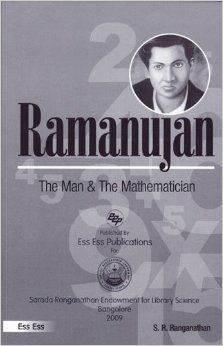Ramanujan, the man and the mathematician
Shiyali Ramamrita Ranganathan
Ranganathan, Shiyali Ramamrita;
Ramanujan, the man and the mathematician
Asia Pub. House (Great thinkers of India series), 1967, 138 pages
ISBN 8170005574
topics: | biography | math
S.R. Ranganathan was famously the librarian at the University of Madras.
He is world-renowned for his development of the idea of faceted
classification, an objective approach to organizing the many views of any
piece of information. (see "Ranganathan’s great discovery of a faceted
classification, a limited and fixed number of necessary associations"
[p.2118, Encyclopedia of Library Science]). He also laid out the
Ramanujan's mother and horoscopes
G. V. Narayansawamy Ayyar, a school teacher in Triplicane who was also a
reputed astrologer, tells this story about Ramanujan's mother.
It was March 1920. An elderly lady came to see Narayanaswamy Ayyar. She had
a note from his erstwhile professor, P.V. Seshu Ayyar, asking him to read a
horoscope.
After reading the note, Narayanaswamy Ayyar asked the lady for the
horoscope. To his surprise, she began to dictate the. horoscope from
memory. He spent some time ·studying the horoscope. Then he asked
her, "What do you want to know?" The old lady asked about the
longevity of the person. After some deep thinking, Narayanaswamy
Ayyar told her, "There is an unusual indication in the horoscope. He
is likely to attain world~wide reputation and die at the height of
his reputation. And if he were to live long enough, he should be an
obscure man. I find it difficult to choose between these two
indications. Who is this gentleman? What is his name? Can you tell
me?" The old lady mentioned the name of Ramanujan.
Later, the lady told Narayanaswamy that she had already surmised that this
was what the horoscope said. N was surprised that "the lady not only
remembered the details of tbe horoscope without the aid of paper, but could
also read the results from it."
So did Ramanujan inherit some of his abilities from his mother? I do not
find this question investigated in any of his biographies.
Ramanujan : Seance after death
Another story tells how after Ramanujan's death, the author does a
seance, along with K.S. Krishnaswami Ayangar. KSK had grown up in
Kumboakonam, where he knew Ramanujan. But unlike him, KSK had excelled in
studies, and become a lawyer. He would later become a judge in the Madras
High Court and a noted Sanskrit scholar.
With the help of the Ouija board, he invoked Ramanujan. There was
response. I asked him whether he was·continuing his mathematics. He
replied, "No. All interest in Mathematics dropped out after crossing
over. I asked him what he was occupying himself with. The reply was
"Meditation. Studying Vishnu-sahasra-nAma."
I then told him about his third Notebook which was in my possession in
the University Library. Only a few pages in it had been filled up. It
was all a series of tabulated numbers. Nobody could make out what it was
about. Could he throw some light on it? Ramanujan replied, "I do not
remember about it. Bring the notebook to this place this time next week.
I will look into it."
The next week, the notebook was taken to Krishnaswami Ayyangar's house.
Ramanujan was invoked. He asked me to turn the pages slowly. Then came
the reply, "I now remember. I was working on Mock-Theta function."
This brought to my mind Prof. G. H. Hardy's reference to Ramanujan
starting work on the Mock-Theta function, before he left Cambridge in
1919. p. 16-17, B4
The current thinking on seances is that the subconscious may impact how we
move our hands to different letters on the board - this spells out answers
that we may be subliminally aware of. So the mock-theta function in this
story. However, it is clear that SRR did have some faith in the process.
Did Ramanujan fail his exams in mathematics as well?
Ranganathan also sheds light on another aspect of Ramanujan's life - his
failure in the F.A. (intermediate) exams at the university. A well-known
note from from his only employer, the Madras Port Trust, stated that "In
December 1907 … he appeared privately for the First Arts Examination and
had the distinction of failing in all subjects, doubtless as a result of
his illness." This has led many to feel that he may have
failed in maths as well.
Traces of the controversy continue even today. In July 2014, the following
comment by SRR was quoted in an article by A. R. Venkatachalapathy in The
Hindu, seeking to end this controversy:
Did Srinivasa Ramanujan fail in math?
It turns out that Seshu Ayyar wished to use some data on marks for a course
on statistics, and asked SRR to collate this data:
[Seshu Ayyar] therefore obtained permission for me to have access to
the old marksbooks of the University for about fifteen yeats; This
was in 1922. These marks~books related to the Intermediate
Examination from 1911 onwards and its predecessor F.A. Examination
during a few earlier years. For my statistical study, 1 had to
transfer the marks to the usual 125 x 75 mm cards,- of course without
the mention of the names of the candidates. But the marks-books
contained the names of the candidates. I found Ramanujan's F A marks
in one of those volumes. He had really scored a very high percentage
of marks in mathematics. His failure was due to poor marks in the
other subjects. ·p.21
[Did Seshu Iyer and SRR do this at least partially with the intention of
gleaning this speck of information on Ramanujan? After all it was only two
years after Ramanujan's untimely death, and interest about him was at peak.
Of course, we may never quite know.]
However, the question had been decided in the 1920s itself, and has been in
the public reccord since 1967.
bookexcerptise is maintained by a small
group of editors. get in touch with us! bookexcerptise [at]
gmail [dot] .com.
